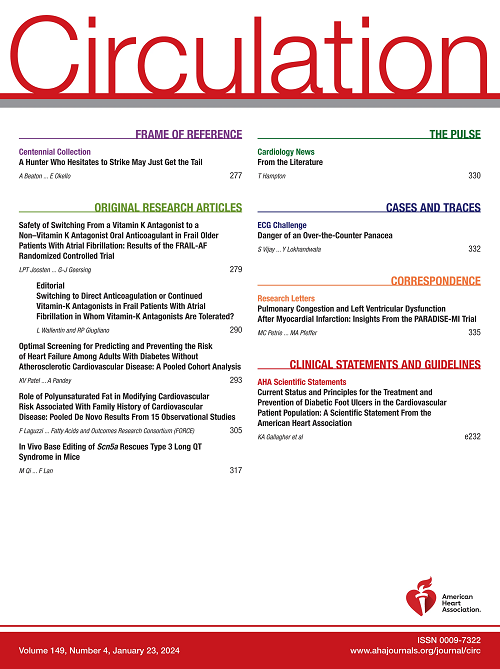Palliative Care and Advanced Cardiovascular Disease in Adults: Not Just End-of-Life Care: A Scientific Statement From the American Heart Association.
IF 35.5
1区 医学
Q1 CARDIAC & CARDIOVASCULAR SYSTEMS
引用次数: 0
Abstract
Cardiovascular disease remains a leading cause of morbidity and mortality in adults despite recent scientific advancements. Although people are living longer lives, there may be an adverse impact on quality of life, necessitating a greater need for palliative care services and support. Palliative care for adults with advanced cardiovascular disease has the potential to significantly improve quality of life for individuals living with cardiovascular disease and their informal care partners. Effective communication, shared decision-making, age-friendly care principles, and advance care planning are vital components of palliative care and support comprehensive and holistic care throughout the advanced cardiovascular disease trajectory and across care settings. Current evidence highlights the benefits of palliative care in managing symptoms, reducing psychological distress, and supporting both people with cardiovascular disease and their care partners. However, significant gaps exist in palliative care research related to non-heart failure populations, care partner outcomes, and palliative care implementation in diverse populations. This scientific statement (1) discusses the application of effective communication, shared decision-making, age-friendly care, and advance care planning in advanced cardiovascular disease palliative care; (2) provides a summary of recent evidence related to palliative care and symptom management, quality of life, spiritual and psychological support, and bereavement support in individuals with advanced cardiovascular disease and their care partners; (3) discusses issues involving diversity, equity, and inclusion in cardiovascular disease palliative care; (4) highlights the ethical and legal concerns surrounding palliative care and implanted cardiac devices; and (5) provides strategies for palliative care engagement in adults with advanced cardiovascular disease for the care team.求助全文
约1分钟内获得全文
求助全文
来源期刊

Circulation
医学-外周血管病
CiteScore
45.70
自引率
2.10%
发文量
1473
审稿时长
2 months
期刊介绍:
Circulation is a platform that publishes a diverse range of content related to cardiovascular health and disease. This includes original research manuscripts, review articles, and other contributions spanning observational studies, clinical trials, epidemiology, health services, outcomes studies, and advancements in basic and translational research. The journal serves as a vital resource for professionals and researchers in the field of cardiovascular health, providing a comprehensive platform for disseminating knowledge and fostering advancements in the understanding and management of cardiovascular issues.
 求助内容:
求助内容: 应助结果提醒方式:
应助结果提醒方式:


